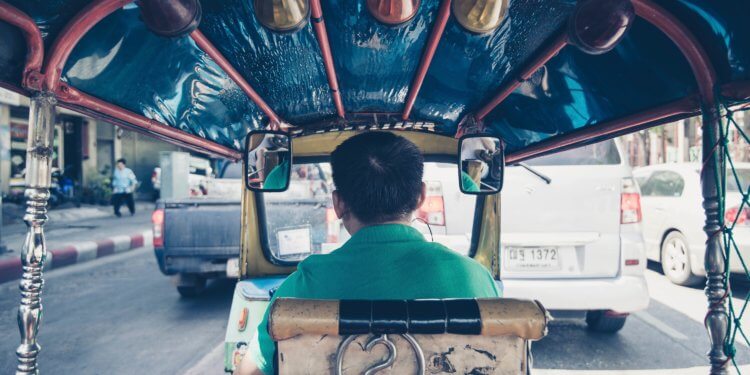
By Lana Orndorff
New things are scary. Strangers can’t be trusted. Unknown places are dangerous. The echo of these ideas are my personal soundtrack as I search for plane tickets. I click the “confirm purchase” button anyway. The intense screaming of my wanderlust, which sounds similar to a small child that has dropped his pacifier, has managed to drown out the low hum of doubt. Fellow travelers know what I’m talking about. But, for those close to me who don’t have wanderlust coursing through their veins, I know my travels make them nervous. Whenever they ask why I travel, I tell them this story.
It was September 2010, and I was backpacking through southeast Asia with my friend Andrea. After issues with visas at the border between Thailand and Cambodia, and an eight-hour long bouncy bus ride, we needed some rest. Our bus finally got to Siem Reap. It was dark and raining. We were in a poorly-lit field. Not a great first impression.
“We have tuk-tuk drivers that will take you anywhere you want to go. Or a hotel just around the corner,” a small Cambodian man announced.
“Is there a phone we could use?” I asked one of the men making arrangements for the foreigners with their tuk-tuk drivers.
“What do we do?” I asked Andrea.
“Well, we’re not paying a hundred and forty dollars a night. Not when we’ve got a room for twenty at the hostel.”
“Ok, I guess we’ll just have to use one of their drivers.”
“Is that safe?” It is so dark we can barely see one another.
“I don’t know,” I hesitated. “But what else are we gonna do?”
We made arrangements with one of the Cambodian guys. It was eleven dollars to take the two of us to our hostel. He walked us into the dark, away from the crowd. We stayed back, unsure of whether we should continue to follow him around the thick, uneven cement wall separating the field from the dirt road. He whistled and motioned us toward a tuk-tuk, a roofed two-seated cart strapped onto the back of a motorcycle, a common form of transportation in Southeast Asia. “This is Pau,” he said extending his hand toward the driver, whose name is pronounced like a punch in a Batman cartoon. “You have the address to our hostel, right?” I asked Pau as firmly as I could without trying to sound bitchy.
He flipped the visor of his overly large helmet, exposing his eyes, but keeping the rest of himself hidden. “Yes. You can trust me.”
“And you will take us straight there, right?”
“Yes. I promise you can trust me.”
“Only there? No where else.”
“Yes. Please, I am very trustworthy. I am an honest man.”
His insistence on our ability to trust him was less than comforting. Regardless, the two of us climbed into the back of the tuk-tuk, the red brake lights shining on us in the dark Cambodian night. Although the rain had cooled the air down, the breeze was a welcome change from traveling in the enclosed bus. All that was visible in the middle of this unknown country was the perfectly round, concealing helmet of a foreign man we had blindly trusted illuminated by his occasional brake light.
Both Andrea and I sat silently looking forward, and a full-on panic set in. Unanswerable questions swirled around in my mind.
“So, how much do you think he’s going to get for selling us into sexual slavery?”
In my peripheral vision I saw Andrea’s hand grab the side of the tuk-tuk, her body stiffen. The uneasiness radiating from her pores. “Why would you even say that right now?” The tone of her voice was full of fear and uncertainty. She didn’t look at me.
“I’m sorry. I use humor to diffuse tension. This isn’t funny,” I apologized. This was real. Something bad could happen to us.
The rest of that 20-minute ride, silent apart from the sounds of the crickets and the low hum of the motorcycle engine, was surprisingly peaceful. We zoomed through the dark countryside and I could see the silhouette of grass, trees, and huts supported by stilts. The heat of the air mixed with the earthy smells of a dirt road.
Pau pulled up to our hostel, the one we had seen on the internet, palm trees delicately hanging over the entrance, and turned off the engine. He helped us check-in, carried both of our backpacks to our room, and refused a tip when we offered. The least we could do was hire him to be our personal driver for the four days we would be staying in Siem Reap. Fifteen dollars a day for the two of us.
“8:30 tomorrow come eat breakfast. I’ll pick you up at 9:00 and take you to temples,” he told us as he replaced his bulbous helmet.
 The next day, we did just that. Pau was amazing. The best tour guide we had of our trip. He not only drove us around, but he made plans and reservations, told us stories about his family and the country, translated for us, took us to great restaurants, and even helped me pick out a pair of aviators when my sunglasses broke. The hidden man in the motorcycle helmet and trash bag poncho had told us he was trustworthy, and he was. Thanks to him we got an an incredible insight into a country our American textbooks had never really taught us about.
The next day, we did just that. Pau was amazing. The best tour guide we had of our trip. He not only drove us around, but he made plans and reservations, told us stories about his family and the country, translated for us, took us to great restaurants, and even helped me pick out a pair of aviators when my sunglasses broke. The hidden man in the motorcycle helmet and trash bag poncho had told us he was trustworthy, and he was. Thanks to him we got an an incredible insight into a country our American textbooks had never really taught us about.
So, here is the point, the lesson: There are lots of horror stories about travel, especially for women. Of course, you should always be on your guard. But, don’t let those stories scare you away from travel. Sometimes you meet people who are just trying to help you, regardless of the fact that you are as much of a stranger to them as they are to you.
Lana Orndorff is a travel enthusiast who makes her home in Chicago and works as a freelance writer. As a reader and writer, she prefers beautifully tragic stories that fracture her heart. Because of this, her husband rarely takes her book recommendations. However, in her daily life, she strongly prefers her heart to remain fully intact. Give her a plane ticket, a bold red wine, caring friends, her loving husband, and a good novel and she is a happy traveler.
Lana has written web content, educational materials, magazine articles, and fiction. She loves helping others express themselves through writing.


